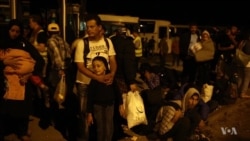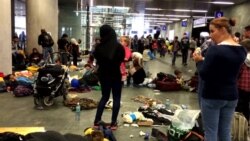Serbia says it is not able to handle the vast number of migrants gathered on its sealed border with Hungary, after Hungarian officials closed the gap in its fence with Serbia as part of a crackdown on the migrants.
Serbian Foreign Minister Ivica Dacic said on Tuesday that Serbia is not a "collection center."
Dacic said it is unacceptable for migrants to have to return to Serbia; at the same time more were arriving from Greece and Macedonia.
Open Border!
Hungarian Prime Minister Viktor Orban said under new security measures that took effect Tuesday, his administration will be tough on those who cross the border illegally.
Police have so far detained about 175 people. Those who enter Hungary without permission could be sentenced to up to three years in prison.
The law took effect a day after European interior ministers failed to agree on a plan to relocate 120,000 migrants across the European Union.
Earlier Tuesday, Hungarian officials closed two official border crossings because of what they said were inadequate controls on the Serbian side. Hungary also declared a state of emergency in two southern counties.
Hundreds of migrants pressed against the new barrier and demanded they be allowed in. They chanted, "Open border, open border!" while police looked on.
A young Pakistani man Zabih Ullah, stuck on the Serbian side of the border, told VOA he wanted the police to let him cross over to Germany. He insisted that he would stay at the border until he was allowed to pass.
Calls for Special Summit
In Berlin, German Chancellor Angela Merkel called for a special summit to address the migrant crisis and urged European solidarity.
Merkel spoke at a news conference alongside Austrian Chancellor Werner Faymann, whose country, like Germany, has seen the arrival of thousands of migrants.
Merkel has said Germany is willing to absorb 800,000 migrants this year. But some European leaders blame Germany for openly welcoming migrants trying to flee war and terror in Syria and elsewhere. Germany has become increasingly frustrated with some EU members that are reluctant to share the burden.
While a majority of the ministers support the plan for binding quotas, many of the objections came from Eastern European nations, including Hungary and Slovakia. Their borders are among the first stops for migrants trying to get to Western Europe.
The ministers did agree on an earlier plan to relocate 40,000 migrants now in Greece and Italy.
At a White House meeting with Spain's King Felipe VI, President Barack Obama said the entire world has to pitch in to help the migrants.
"We agreed that this is going to require cooperation with all the European countries and the United States and the international community in order to ensure that people are safe, that they are treated with shared humanity and that we also may have to deal with the source of the problem, which is the ongoing crisis in Syria."
Obama said he told the king it is important that the U.S. also take its share of Syrian refugees.
WATCH: Heather Murdock reports on the situation in Vienna, Austria
EU indecision
The International Organization for Migration (IOM) warns more migrants and refugees will die as a direct result of the European Union’s inability to make a decision on how to tackle the crisis sweeping Europe.
September has been a deadly month for migrants. Just over the past few days, the IOM estimates 72 migrants have lost their lives trying cross into the Greek islands from Turkey.
And, it says data received from the Turkish Coast Guard show some 13 migrants already have died in Turkish waters through the beginning of September. IOM spokesman Leonard Doyle says this makes September the deadliest month on that stretch of the Mediterranean in two years and that the situation will only worsen.
“As the seasons turn and as the weather gets colder and as the dangers increase, we fear that the lack of decisions — that the indecisions in Europe will lead to more deaths in the Aegean,” he said.
The IOM set up a national toll free “157 Helpline” in Turkey in 2005 to assist in the rescue of trafficking victims who are smuggled across the Mediterranean and Aegean Seas in flimsy boats. Leonard Doyle says this hotline today acts as a lifeline for many.
The U.N. refugee agency says it believes the crisis is manageable if European countries cooperate on finding a solution, adding the consequences of indecision are dire. It says refugees and migrants will suffer and be stuck in legal limbo as they are shunted from one country to another. It says Europe also will suffer.
Migrants, a Plus
Separately, a researcher at the Institute for Public Policy Research in London told VOA that to some the influx of refugees to Europe is a positive thing because it is replenishing the population of an aging continent. He said the migrants, once employed, will be supporting state health and pension systems with their taxes.
"I think [that] if you look at countries like Germany, like Spain, they are aging populations, they are shrinking populations," researcher Marley Morris said in a phone interview. "They really do need migrants in order to sustain their economies in the coming years. And, I think, that’s partly why some countries like Germany are being quite welcoming in attitude."
According to Morris, a lot of the migrants have skill sets and educational backgrounds that belong in the European marketplace.
"There are a number of [university] graduates coming over [to Europe]," Morris said. "There are a number of people who have ‘middle skills’ – a middle skills set. Really, what many of these countries like Germany really need in their labor market. You know, so long as these labor markets are able to integrate these newcomers into their societies, then they will be able to help sustain their economies.”
More than 430,000 migrants seeking a better life, including refugees from Syria and Iraq, have crossed into Europe this year. Migration watchers say nearly 3,000 have died trying.
William Gallo and Mike Richman contributed to this report from Washington Lisa Schlein contributed from IOM headquarters in Geneva.











